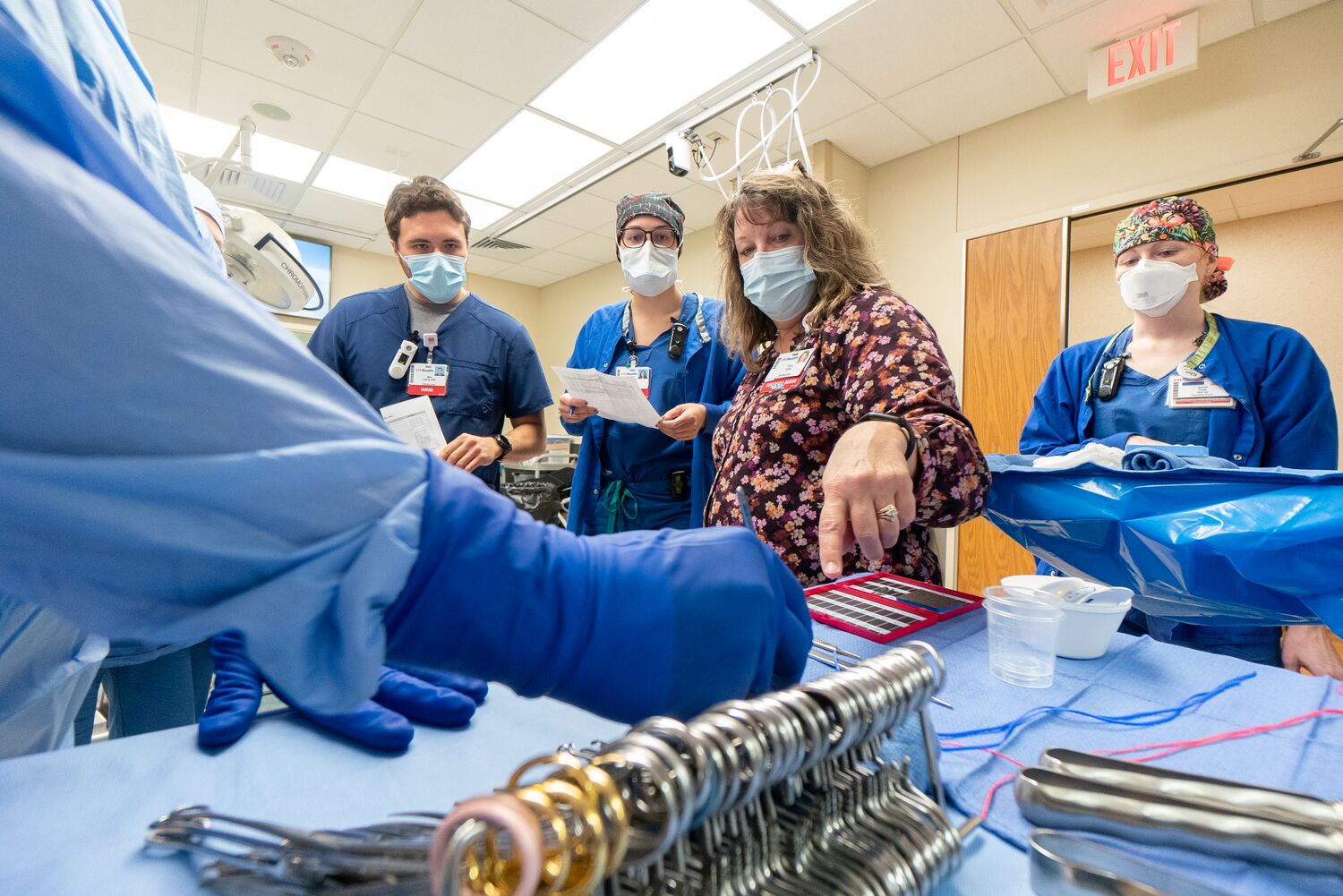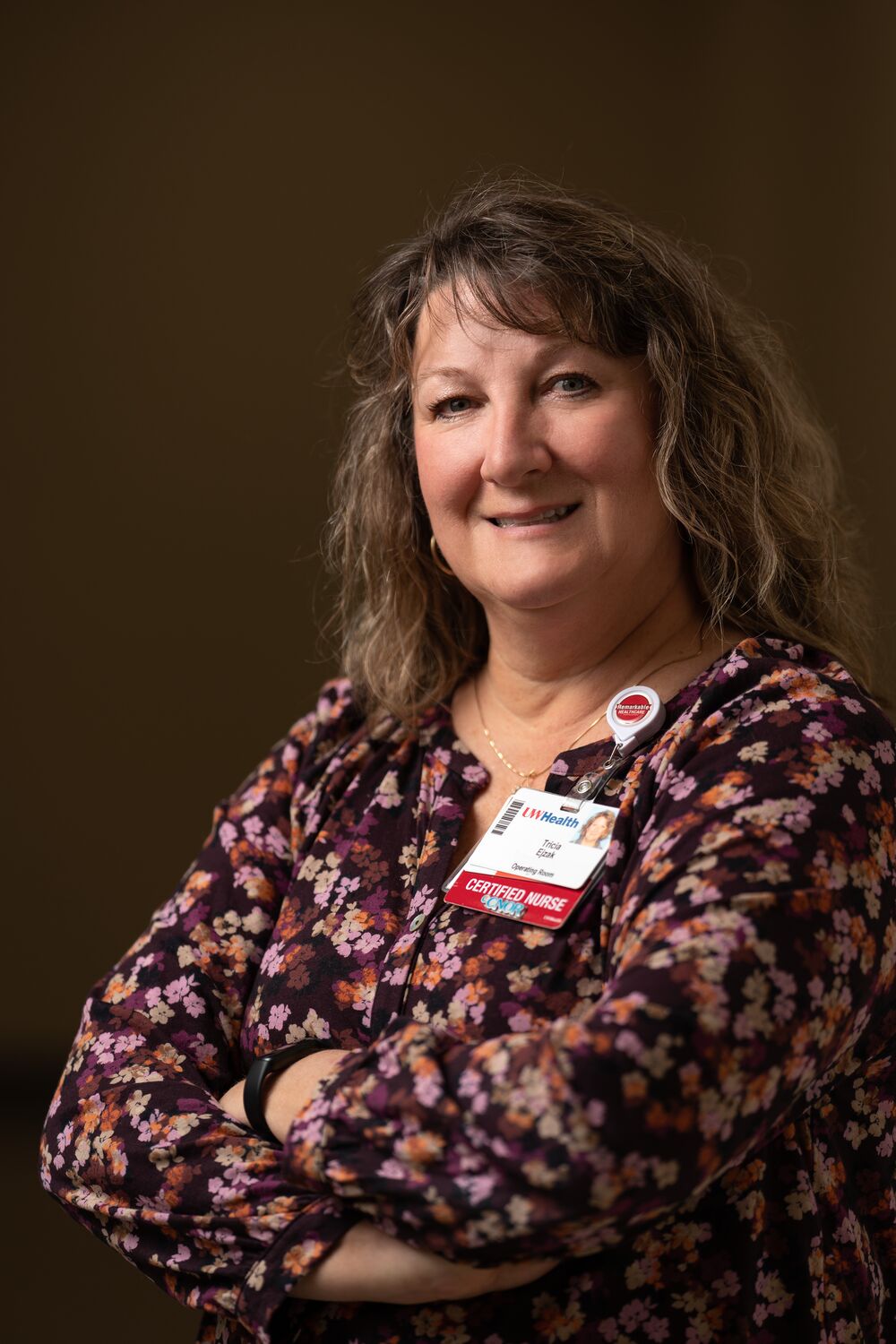
Even with the constant changes in health care, UW Health nurses are endlessly knowledgeable and incredibly skilled. But where do they go for the learning and professional development that allows them to be so infallible? This is where the Department of Nursing Professional Development comes in.
Nursing Professional Development includes more than 20 nursing education specialists who are responsible for clinical staff onboarding, professional development, new equipment, procedure and protocol training, and management of the prestigious Nurse Residency Program, which onboarded nearly 200 nurse residents this year.
Nursing education specialists work to ensure staff have the tools and education they need to be confident in their abilities to provide remarkable care and feel fulfilled working at UW Health.
“Mentorship and advocacy are the foundations of my practice as an educator,” said Molly Daniels, MSN, RN, CMSRN, nursing education specialist.
“We are champions for both the orientee and preceptor,” said Bianca Nelson, MSN, RN, CCRN, nursing education specialist. “Our job is to advocate for the nurse and tie education and professional development back to better patient outcomes.”

Tricia Ejzak, MSN, RN, CNOR, provided a closer look at her role as a nursing education specialist in the operating room:
Q: What does a typical day look like as a nursing education specialist?
A: Every day is different. As an NES in the operating room at East Madison Hospital, I am responsible for onboarding all new staff who will work in the OR. When someone starts, they spend their first week with me practicing skills and learning how to be safe in the space before moving on to work with a preceptor.
Since I work with the OR team, I monitor quality measures for surgical site infections and educate staff on opportunities for improvement. Another focus is continuing education. If there is a new procedure, new equipment or equipment that staff needs more experience with, I ensure they have the training they need. I also support staff with their professional goals and manage required trainings.
Q: It sounds like you also create process efficiency?
A: Absolutely! A new sports medicine surgeon started doing a procedure with a risk of significant blood loss. In those instances, we use a Fresenius Kabi Continuous Autotransfusion System to collect and clean blood for reinfusion. In the past, for every procedure, a trained technician from University Hospital had to travel to East Madison Hospital in case we needed to use the machine. Knowing the process could be more efficient, I coordinated training on the Fresenius Kabi Continuous Autotransfusion System for eight of our OR nurses. Now, we have trained staff at East Madison Hospital.
In addition, all the surgical nursing education specialists recently created a centralized OR orientation. We teach core content and utilize the UW Health Clinical Simulation Program facility for a more realistic training environment. With centralized orientation, we are more efficient and can now back each other up, when needed.
Q: How do you know what to focus on as an NES?
A: We get direct requests from staff members and feedback from surveys. I work closely with OR leadership who inform me of any practice and protocol changes.
Q: What is the best part of being an NES?
A: My job allows me to work with remarkable people in many different departments. I also enjoy being a part of the NPD team. Everyone is incredibly knowledgeable and supportive. It is tremendously fulfilling.
Nursing Education and Professional Development 2022 at UW Health
| Ambulatory: Clinical Staff Education Department | Inpatient: Nursing Professional Development Department | |
| Staff onboarded | Clinical staff: Registered nurses (RNs), medical assistants (MAs) and other clinical roles: 280 Non-clinical: 829 Online orientation: 734 employees Ambulatory nurse residents: 13 | Registered nurses: 524 Nursing assistants (NAs): 318 NAs hired through the NA Apprentice Program: 61 Age-friendly partner: 2 Student nursing assistants: 63 Nurse residents: 203 Nurse externs: 28 Personal safety observer: 1 Nursing care partners: 74 Anesthesia technicians: 2 Surgical technicians (STs): 7 ST travelers: 2 |
| Nurse resident cohorts | 2 with 432 hours of education provided, including 52 lectures from content experts and 15 skills sessions | 7 (increased from 6 to accommodate hiring more nurse residents sooner) |
| Staff trained | Retrained all primary care staff in COVID vaccine reconstitution and administration Conducted 75 N-95 trainings for specialty care clinics | Critical Care class: 111 Intravenous Ultrasound class: 81 Preceptor workshop: 202 Advanced Preceptor workshop: 28 Peripheral IV class and roadshow: 165 Nurse Resident (NR) IV skills: 147 Inpatient Trauma class: 80 Nursing assistant professional development: 68 Basic Arrhythmia class: 218 Continuous Renal Replacement Therapy Advanced User course: 54 Adult Stroke class: 35 Maternal mock code training to improve care and outcomes for pregnant patients: 56 RNs Non-violent crisis intervention (NVCI) Initial class: 54 NVCI Refresher class: 28 |
| Annual competencies/validation tools created for the staff-driven competency process | Comprehensive staff-driven competency packages for RNs: 9 Shifted medical assistant focus to CEU/educational opportunities | Competencies: 65 Validation Tools: 130 |
| Education requests completed | Completed Health Link (electronic medical record) Nurse Decision Support Tool rollout to primary care sites. Offered 180 hours of on-site triage support, 16 trainings and 12 Q&A sessions in addition to offering WebEx messaging RN support, Monday–Friday, 8 am–5 pm to nurses using the new tool. | In partnership with the Nursing Education Council, established Nursing Professional Development Days. |
| Other notable accomplishments | Competency management January 2022: Released competencies covering approximately 1,000 staff members as part of Annual Staff-driven Competency. Improved electronic process to make system more user-friendly for end user. Educators relieved managers of validation method checking and competency completion responsibilities. Evidence-based practice Held 24 Introduction to Triage and 7 Advanced Triage classes. Piloted one Nurse Extern cohort with 10 scheduled for 2023. | Perioperative nursing student shadow experience Spring 2022 collaboration with the University of Wisconsin-Madison School of Nursing to host nearly 50 Bachelor of Science in Nursing students for a perioperative shadow experience from First Day Surgery to intraoperative to Post-Anesthesia Care Unit. Revised Nurse Resident (NR) Orientation Added more hands-on skills and specific breakout sessions for pediatrics and surgical services. Goal was to provide NRs with more basic skills to help reduce the amount of teaching help needed from the nursing education specialist and reduce the preceptor workload on units. |
Check out more stories featuring the great work of our nurses in the 2022 Nursing Annual Report (pdf).
